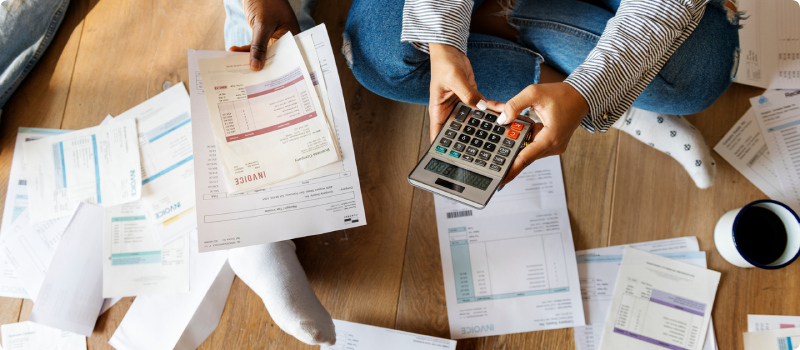Buying a House With Credit Card Debt
Updated October 5, 2020 . AmFam Team
Did you know in 2019, over 5.3 million homes were sold, according to the National Association of Realtors? If you’ve ever dreamed of having a home to call your own, you’re not alone. Yes, it is absolutely possible to buy a house with credit card debt. And by lowering your debt-to-income ratio before you apply for a loan, you may qualify for a better interest rate, too.
It’s safe to say that a lot of people just like you are wondering, “Can I buy a house if I have bad credit?” Nerdwallet.com has found that the average household in the US carries about $6,849 in credit card debt. So, how much debt can you have when buying a house? Good question.
Mortgage lenders will review your bank statements and tax documents to get an idea of how much money is coming in — and going out — each month. And if your debt-to-income ratio looks good, you may be able to buy a home with credit card debt and a low credit score. We’re here to help show you how.

How credit card debt may affect the home buying process
Credit card debt can impact your ability to qualify for funding when seeking a mortgage. That’s partially because the card’s interest rates can spiral out of control if payments are missed. Getting a mortgage with credit card debt is really all about determining the risk you present to the lender. If you’ve been paying your bills and credit cards on time — every time — that will help. Here are the other key factors mortgage brokers consider when exploring your financial history:
- Loan eligibility
- Credit score
- Assets and debts
- Debt-to-income ratio
- Tax payment history
How credit card debt affects credit score
Your FICO credit score used by credit reporting agencies is driven by a number of key financial statistics. These range from the way you’ve been paying down loans and credit cards to the mix of old debt to new debt you’ve taken on. The data in your credit report is used to create your credit score. And from that, lenders are quickly able to make a snap judgement on your creditworthiness for buying a home.
Credit card debt can affect your credit score in much the same way other debts do. And your credit utilization ratio (CUR) is also important. For instance, if you’ve got a total of $10,000 in available credit and only owe $1,500, your CUR is 15 percent. In most cases, lenders like to see that figure under 30 percent. Higher credit scores indicate to lenders that you’re probably less of a risk.
Understanding debt-to-income ratio for a mortgage
In order to calculate your debt-to-income ratio (DTI), you’ll first need to add up the total of your monthly debt payments you make and then divide them by your gross monthly income. Note that your gross income is the amount of money you receive before taxes and other deductions are taken out.
Suppose you’re planning on spending around $2,800 a month on your mortgage, credit card bills, auto loans and other debts — and you're monthly gross income is $6,500 — your resulting DTI is around 43 percent. That’s just about as high as lenders want it to be, in order to qualify for a home loan with credit card debt.

4 tips for buying a house With credit card debt
Before making the move to apply for a mortgage, there’s a lot you can do to build up your credit to help get your home loan funded. And these ideas can help bring interest rates down, which can make a big difference in total money paid out over the life of your home loan. Take a look at these tips on how to get a mortgage with high credit card debt:
Tip 1. Consolidate your credit card debt
If you’ve got debt on several credit cards, look into consolidating your credit cards to one with lower interest. Afterwards, you’ll only have to manage one payment, and that means more of your hard-earned cash will go towards paying off that debt.
Tip 2. Look carefully at your credit report
Because your credit report and credit score weigh so heavily when applying for financing, it’s key to get a free copy of your credit report before seeking financing for a mortgage. Review all the details on the report and verify that each item listed is correct.
To get your report, you’ll need to contact each of the agencies separately and request it.
- Equifax (Opens in a new tab) or call 1-866-349-5191
- Experian (Opens in a new tab)or call 1-888-397-3742
- TransUnion (Opens in a new tab)or call 1-800-916-8800
You can sign up with a company like freecreditreport.com that offers free reporting. If you find any errors or issues, reach out to each credit reporting agency and file a request for a correction. All of the websites above will offer specific details on how to file a credit report dispute. If it's easier, remember that you can also file an inquiry for correction with credit agencies by simply calling them.
Tip 3. Pay above the minimum amount due on your credit cards
This trick — paying more than the minimum amount due — can quickly knock debt down in size. That’s because you’re able to more quickly decrease the amount you owe on credit card debt, which is used to factor the amount of interest you’re paying every month. With less debt, you’ll be pushing less money towards interest and keeping more of your hard-earned cash.
Tip 4. Build a workable budget
It can be tempting to want nice things for your new home while you’re in the process of getting your mortgage funded. Big expenses and payouts made when your finances are under review can throw a flag with your mortgage lender. So, do your best to only purchase the necessities you need to move and get organized for the move in the meantime. You’ll have time for major purchases after closing on your new home. Until then, it’s key to make a budget and stick to it.
Next steps for home buying
Once you’ve got a handle on your credit rating and your credit card debt is under control, it’s time to start shopping for a home! And that starts by applying for a mortgage and working with a lender. Take a look at our first-time home buyer’s guide for the details you’ll need to know to get a mortgage for the home of your dreams.
And be sure to reach out to your American Family Insurance agent to get a quote on homeowners insurance. They can get you easy-to-understand coverage for one of the biggest investments you’ll ever make.
This article is for informational purposes only and based on information that is widely available. This information does not, and is not intended to, constitute legal or financial advice. You should contact a professional for advice specific to your situation.
Tools & Resources
NextScripts
JSS component is missing React implementation. See the developer console for more information.

